![A transport of Jewish prisoners marches through the snow from the Bauschovitz train station to Theresienstadt. [LCID: 69720]](https://encyclopedia.ushmm.org/images/large/781755a6-1ba5-4d8e-8b2b-9f25bdf3687f.jpg)
Browse an alphabetical list of documents from the Holocaust and World War II. These typed, handwritten, and artistic records are evidence of human experiences before, during, and after the Holocaust and war.
<< Previous | Displaying results 1-8 of 8 for "Document" | Next >>
Safe conduct pass issued to Hans Landesberg in the Djelfa internment camp, releasing him to leave for Algiers. Djelfa, Algeria, January 26, 1943. Hans was born in Vienna, Austria, and went to medical school. After graduating, he left for Paris and joined a battalion of the International Brigade to fight in the Spanish Civil War. He returned to France in February 1939, only to be interned first in Argeles and then in Gurs. Some time after the French surrender to Nazi Germany in June 1940, Hans and other…
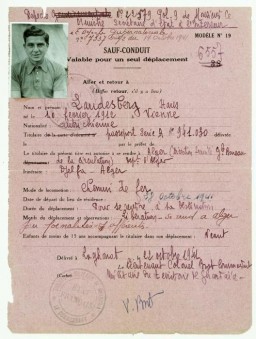
A letter from Salek and Eda Kuenstler to Sophia Zendler promising land in exchange for hiding their daughter.
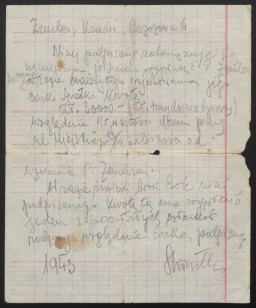
A second RCA Radiogram telegram from Rabbi Grodzenski, Chief Rabbi of Vilna, to the Central Relief Committee in New York. He requests aid for refugees who have gathered in Vilna. The telegram says that more than 1,600 yeshiva students and their families from over 10 cities throughout Poland have fled to Vilna, where they remain in terrible living conditions. November 5, 1939. [From the USHMM special exhibition Flight and Rescue.]
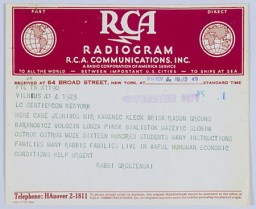
Seward Daily Gateway (Alaska) article from April 14, 1933, titled "Great Bonfires of Forbidden Books in Germany to Blaze." This article from Berlin, written the month before the book burnings took place, reported that "Great bonfires will be burning on the campus of German universities in a few days, when the latest Nazi decree goes into effect. The Hitler regime is continuing its nationalistic crusade, has ordered that all books which deal with non-German subjects or espouse non-German causes, must be…
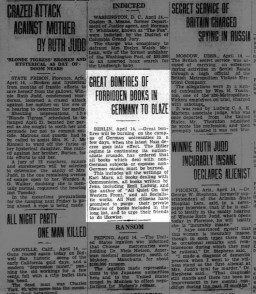
After adopting a new identity in late 1943, Simone Weil falsified her student card from the year 1938-1939 to bear her assumed name, Simone Werlin. The card verified enrollment in the School of Social Work in Strasbourg. Using forged and falsified documents, Weil was able to move to Chateauroux, France, and establish an operation to rescue Jewish children as a member of the relief and rescue organization Oeuvre de Secours aux Enfants (Children's Aid Society; OSE).
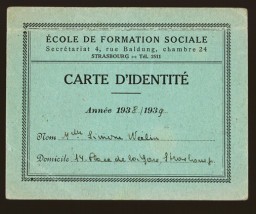
Simone Weil earned this diploma, which certified her to teach kindergarten in France, from the School of Social Work in Strasbourg in 1940. Weil assumed a false identity in late 1943 to facilitate her resistance activities as a member of the relief and rescue organization Oeuvre de Secours aux Enfants (Children's Aid Society; OSE). Among the papers documenting Weil's new identity was a forged version of this diploma bearing the name "Simone Werlin".
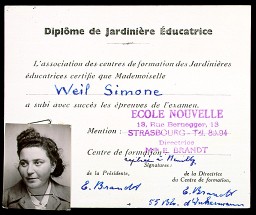
The Soviet travel agency Intourist issued this type of luggage tag, showing a route map, to passengers on the Trans-Siberian Express. Some Jewish refugees traveled on the Trans-Siberian Express as they fled eastward. [From the USHMM special exhibition Flight and Rescue.]
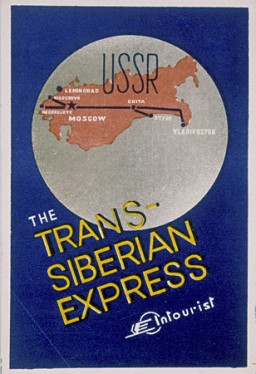
Protective document issued to a Jewish woman by the Swedish embassy in Budapest, Hungary, in 1944. Such documents protected the bearer from immediate deportation by the Germans to the Auschwitz killing center in occupied Poland. The "W" in the lower left corner indicates that Raoul Wallenberg initiated the document.
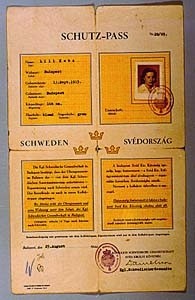
We would like to thank Crown Family Philanthropies, Abe and Ida Cooper Foundation, the Claims Conference, EVZ, and BMF for supporting the ongoing work to create content and resources for the Holocaust Encyclopedia. View the list of donor acknowledgement.